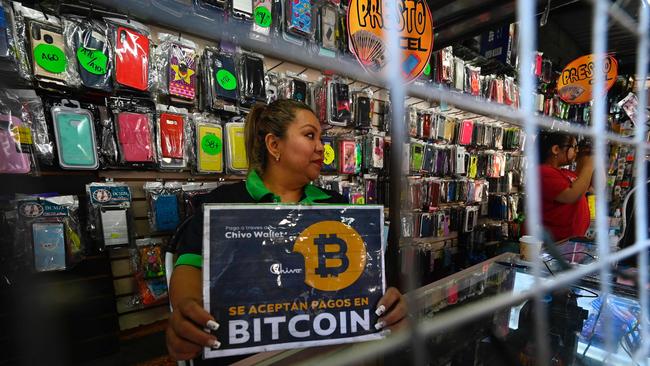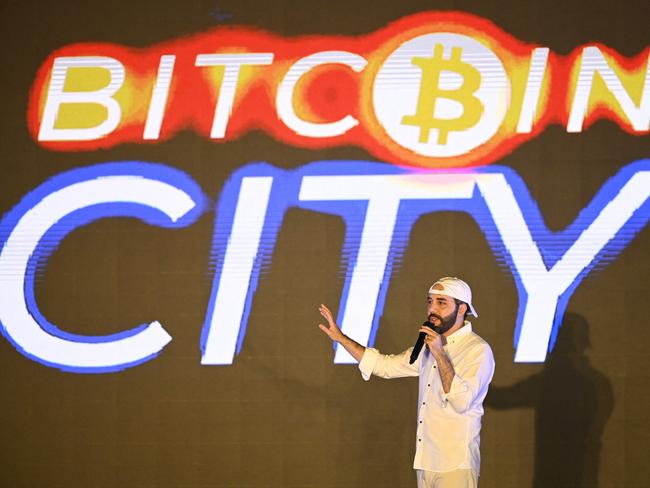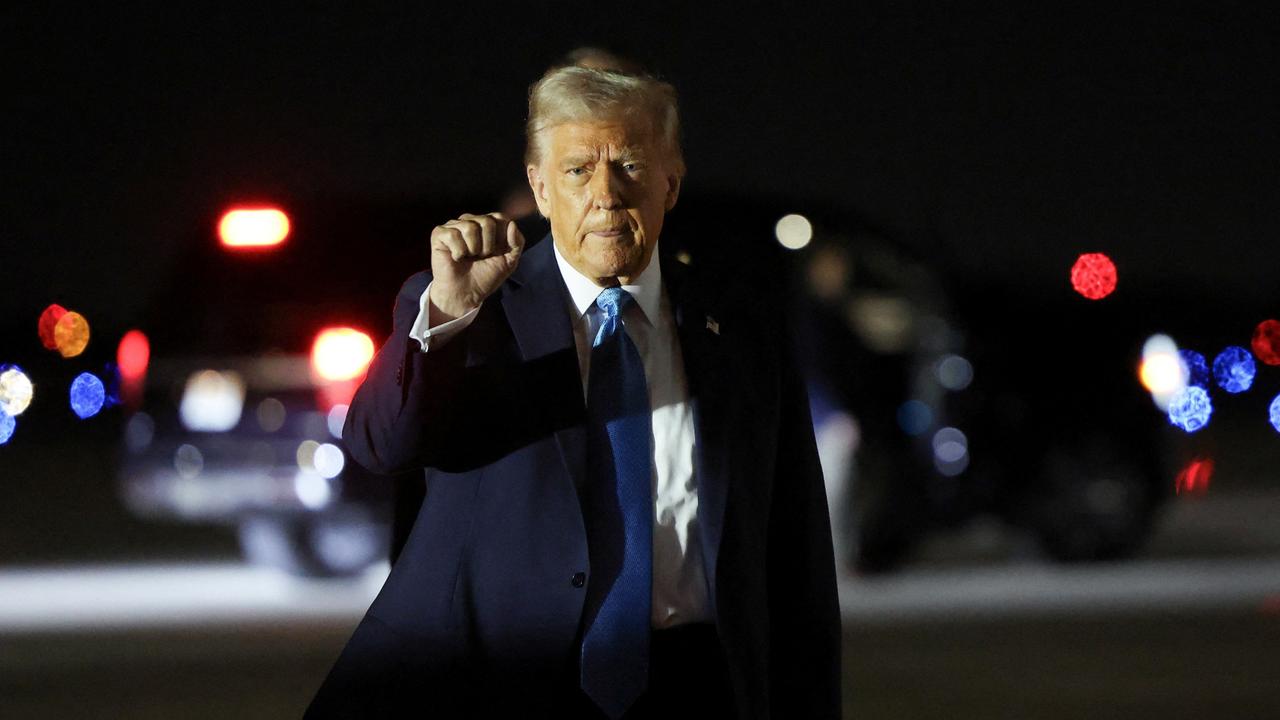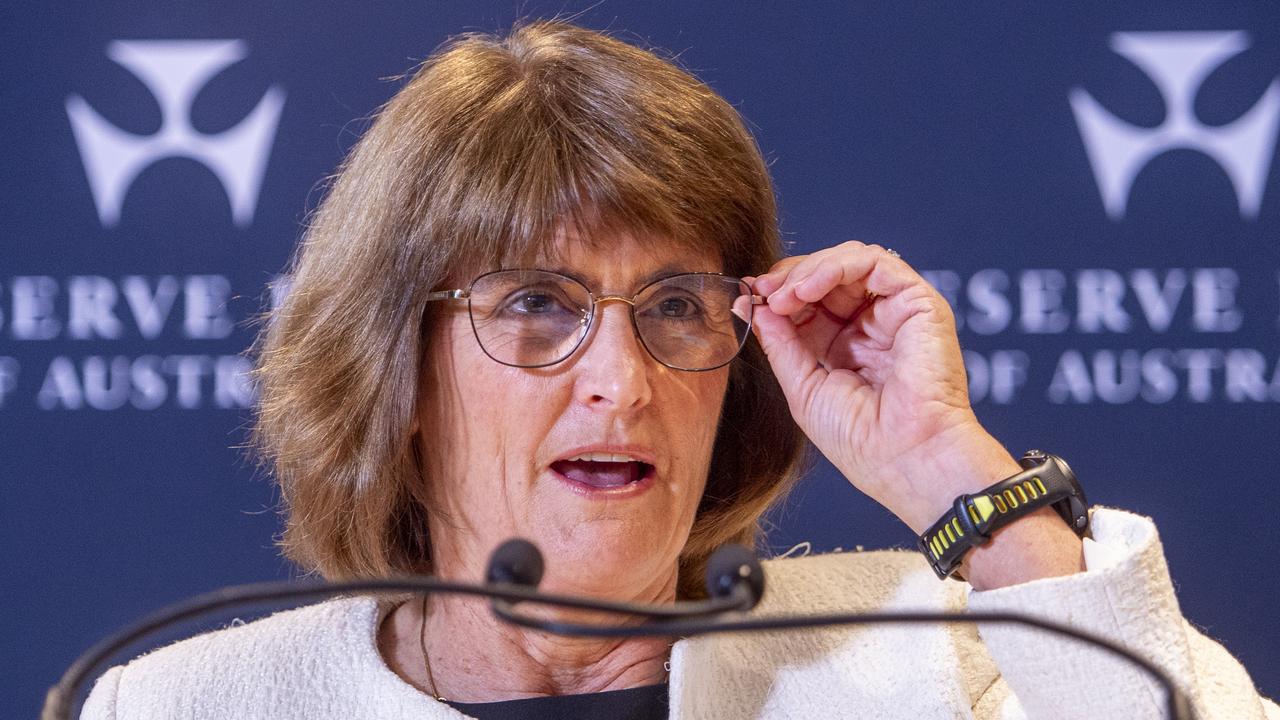Can bitcoin be a national currency? El Salvador is trying to find out
The Central American country made bitcoin legal tender last September and is aiming to fund expansive economic policies by cashing in on the crypto craze.

El Salvador President Nayib Bukele called Canadian video game developer and bitcoin enthusiast Samson Mow up on stage at a beachside bitcoin convention in November that had the flair of a rock concert.
In front of a screen emblazoned with the phrase “Feel the Bit”, Mr Mow unveiled the tiny Central American country’s novel international finance idea: a plan to raise $US1bn ($1.4bn) by issuing the world’s first bitcoin-backed sovereign bond. The crowd, a mix of mostly crypto advocates, Bukele fans and a few curious locals, erupted in loud cheers as they filmed the event on their smartphones.
“Bitcoin is going to change the world,” Mr Bukele, dressed in all white, said at the event. “It’s the evolution of humankind, and we’re going there.”
In less than three years in office, Mr Bukele has moved fast to remake his country. He has removed judges and stacked the courts with his supporters, harassed journalists reporting on corruption and clashed with the Biden administration. Wearing leather jackets, aviator shades and a backward baseball cap, he has revelled in the political skirmishes, jokingly referring to himself as “the coolest dictator”.
The 40-year-old President is perhaps best known for turning El Salvador into a real-life laboratory for bitcoin, providing enthusiasts and sceptics alike with a test case to see how far crypto can go beyond its current status as a popular speculative investment and unregulated means of exchange. In September, El Salvador became the first country to adopt bitcoin as legal tender, forcing local merchants to accept it as payment.
The country is aiming to cash in on the crypto craze by tapping new markets to borrow and using profits from bitcoin mining to back expansive economic policies under its President. Mr Bukele says bitcoin wealth can address the poverty and violence of El Salvador and turn it into the Singapore of Latin America.
The bond sale will test whether developing economies can skirt traditional Wall Street banks and lenders of last resort such as the International Monetary Fund, which often impose austerity conditions, in favour of funds from a growing pool of investors in the $US1 trillion world of bitcoin.
So far, the reaction has been divided. The IMF has criticised El Salvador’s move to bitcoin, saying its price swings are too risky for the small economy and that Mr Bukele’s policies are pushing indebtedness to “an unsustainable path”.
Since bitcoin’s adoption as currency, its use in day-to-day transactions has been rare, and a recent poll found that about 70 per cent of respondents didn’t trust the government’s move.

The planned bond, meanwhile, will trade on a platform restricted for Americans, limiting their participation. El Salvador’s traditional sovereign bonds were the worst performers of emerging markets last year, trading at a steep discount and offering yields near 17 per cent because of rising default risks.
The offering of the bitcoin-backed bond, which the administration has dubbed “The Volcano Bond”, is slated for as early as this month or March. The bond would provide US dollars to the country and must be paid back in dollars.
El Salvador’s government says it plans to use half the bond offering – $US500m – to buy more bitcoin, and the other half for infrastructure development, including a future Bitcoin City, a tax-free zone for entrepreneurs where new bitcoin could be mined using the thermal power from an extinct nearby volcano.
The 10-year bond offers investors an interest rate of 6.5 per cent with additional dividends after five years, after El Salvador plans to start selling some of its bitcoin investment at a potentially higher future price and reaps expected profits.
Mr Mow, 42-year-old chief strategy officer at the tech firm Blockstream, which is co-ordinating the offering, said El Salvador would have no trouble raising the money, largely from crypto fans who want to invest in a country pioneering bitcoin adoption. Mr Mow, who is marketing the offering to investors, said he has already received $US500m in verbal commitments from prospective buyers. The figure couldn’t be confirmed by The Wall Street Journal.
Salvadoran officials say they are already considering raising as much as $US5bn through several more bitcoin-backed bond offerings. Mr Bukele and Finance Minister Alejandro Zelaya declined to comment.
One local financial executive said demand for the bond would be linked to its novelty, not El Salvador’s economic fundamentals, referring to it as a “meme” bond.
The President, a former nightclub owner and marketing executive, was gambling with taxpayers’ money in an attempt to keep up high levels of public spending that were a key ingredient to his popularity, said Carlos Acevedo, former governor of El Salvador’s central bank. Because El Salvador adopted the US dollar as its official currency two decades ago, it can’t crank up the printing presses like most countries when it needs to spend more money. It has to earn the dollars through exports, remittances or tourism, or borrow them. Under Mr Bukele, who took office in 2019, the country’s budget gap doubled to almost 6 per cent of gross domestic product in 2021.
The IMF, which is in protracted negotiations over a $US1.3bn financial aid program for the country, has called on Mr Bukele’s government to ditch bitcoin’s status as a national currency, saying its price swings make it too risky for consumers or to be used as collateral for sovereign bonds.
Developing countries around the world sell government bonds in foreign currencies such as US dollars, euros or yen to fund public spending. Some of them, like Argentina, have defaulted on numerous occasions as they struggle to earn sufficient hard currency to pay down debt.
With bitcoin, the stakes are higher. The bond can lure investors who are searching for higher yield or aren’t allowed to invest directly in bitcoin due to regulations, the IMF noted in a recent report. But the crypto asset lacks the economic fundamentals to support its value, and it trades entirely on sentiment. Its sharp price swings could increase debt servicing costs or force the government to use El Salvador’s limited foreign-currency reserves to cover a loss in value, economists say.
The adoption of bitcoin fits with Mr Bukele’s self-styled image as a young, hip leader leaning on financial and technological innovation. The move has given him celebrity status among a wealthy global community of bitcoin enthusiasts. “Most bitcoiners are willing to die on this hill, and right now, that hill is El Salvador,” Mr Mow said.
Mr Bukele, a former hands-on mayor of the nation’s capital, San Salvador, won the presidential election by a landslide in 2019, pledging to eradicate corruption in a country long scarred by civil war, gang violence and drug trafficking. For his presidential run, he broke from the country’s dominant leftist political movement, the FMLN, and formed his own party along with his siblings, who have gone from campaign organisers to unofficial presidential advisers on matters ranging from bitcoin to pandemic response.
Since his election, gang violence has fallen sharply, allegedly after he made a secret truce with them, according to US officials. The IMF estimates the economy grew 10 per cent last year thanks to sound management of the pandemic. His administration aggressively pursued Covid-19 vaccines early, helping Mr Bukele hit approval ratings above 80 per cent, polls show. That made him the most popular leader in Latin America at a time when most incumbents were being vilified.
At the same time, opponents and rights groups say he has grabbed power by firing his attorney-general, and by firing the justices of the country’s top court and dozens of judges in lower tribunals so he could stack the judiciary. He also had the Supreme Court reinterpret the constitution to allow him to run for a second term. The manoeuvres have soured ties with Washington.
The plan to adopt bitcoin as currency took Salvadorans by surprise when it was first unveiled in June by Jack Mallers, a 27-year-old American bitcoin entrepreneur. He wore a baggy hoodie and a baseball cap as he presented the plan at a bitcoin conference in Miami under the title: “One Small Step for bitcoin, One Giant Leap for Mankind”.
A jubilant Mr Mallers opened the floor to a video recording in English by Mr Bukele announcing he would send a bill to the National Assembly to make bitcoin legal tender. The crowd rose for a standing ovation. A few days later, politicians passed a three-page bill, which Mr Mallers said he helped draft, within hours. The legislation wasn’t debated at the congressional committee level. Unions and business groups say they weren’t consulted.
Mr Bukele’s government has spent $US180m rolling out bitcoin ATMs and an e-wallet with $US30 worth of free bitcoin for anyone who signs up. The government says the vast majority of residents signed up for the e-wallet, which is known as Chivo, local slang for cool, but shopkeepers report there are few sales using bitcoin, since the crypto’s price swings make using it for day-to-day transactions awkward.
Most Chivo e-wallet users took the free bitcoin and cashed it out for dollars, according to financial-sector executives. Others allege their money in Chivo vanished through fraud. Ruth Lopez, lawyer for the San Salvador-based rights advocacy group Cristosal, said her organisation has collected the signatures of more than 1000 Salvadorans who say their identities were stolen through Chivo and were defrauded of their $US30. Ms Lopez said Cristosal filed a suit with the Supreme Court in November seeking an investigation but hadn’t received any response.
Adoption has been slow in a country where two-thirds of Salvadorans work in the informal sector. Cash for most Salvadorans remains king. “We’re a people who like to touch our money,” said San Salvador cab line operator Danilo Martinez.
In the port city of La Union, near the site where Bitcoin City is slated to be built, 42-year-old fisherman and boat tour operator Luis Robles said he hoped new development in his region – along a prime drug-trafficking route – would mean more work for him. He also thanked Mr Bukele for bringing crime down in La Union, where up until a couple of years ago gang conflict kept most residents locked in their homes.
The father of three scoffed at using bitcoin, calling it a mystery. “It’s going to be a real challenge for me to figure that stuff out,” Mr Robles said. “Especially because I’m illiterate.”
Bitcoin could add a special risk for El Salvador, which has long been known as a home to criminal gangs that also have an extensive presence in the US. Bitcoin’s decentralised system opens doors to anonymous and illicit transactions, like money laundering, tax evasion or ransom payments, economists say.
The planned bond will be the first sovereign debt security to trade like a crypto token on the Bitfinex platform, according to Mr Mow. It won’t be available on usual bond markets.
US citizens and businesses are barred from using Bitfinex. Mr Mow said Americans could invest through broker dealers outside the US or through offshore funds that participate in the bond. Last year, iFinex, operator of Bitfinex, reached a settlement to pay $US18m in penalties to the New York Attorney-General’s office after prosecutors accused the company of hiding $US800m in losses through fraudulent financial statements.
When nations issue debt, their bonds are typically backed by New York or Luxembourg laws that grant creditors some international protections. The bitcoin bond will be the first security to be structured under El Salvador law, according to Mr Mow. The government is expected to unveil legislation soon that will regulate the bitcoin bonds.
In late July, Moody’s Investors Service lowered the rating of El Salvador’s traditional bonds further into junk territory, citing “a deterioration in the quality of policymaking” because of bitcoin’s adoption and other measures. Fitch Ratings followed suit earlier this month, saying the “weakening of institutions and concentration of power in the presidency have increased policy unpredictability.”
On Twitter, Mr Bukele is irreverent in mocking critics and in touting the country’s crypto moves. He posts about bitcoin purchases that he says his government has made by “buying the dip.”
In January, when the price of bitcoin dropped 27 per cent, Mr Bukele said his government bought 410 bitcoin for $US15m. “Some guys are selling real cheap,” he said on Twitter.
While there is no public data on the transactions, Wall Street analysts have counted about 1,800 bitcoin purchases for an investment of around $US85m, a not small number for a tiny economy of $US27bn.
For much of last year, Mr Bukele’s photo on his Twitter profile featured laser eyes, an image used by crypto enthusiasts. He then changed it for a time to a photo of him wearing a Julius Caesar style toga with a laurel, identifying himself as “Emperor of El Salvador” before relabeling as “CEO of El Salvador.”
The president enjoys trolling his critics, said Mr Mow. Earlier in his tenure, Mr Bukele once forgot to take off a backward baseball cap that he had been using to keep his hair slicked back in his presidential vehicle. When he noticed that his detractors were irked by his unusual attire, he turned the hat into his trademark look, Mr Mow said, recounting a story he said he had been told by the president’s advisers. “You take what the critics throw at you and run with it,” Mr Mow said.
Some bitcoin investors are wary of Mr Bukele turning into the poster child for bitcoin. “It’s difficult because you don’t want to support the Bukele administration while they dismantle democratic institutions faster than Hugo Chávez, ” said Alex Gladstein, a bitcoin proponent who is also chief strategy officer at the New York-based Human Rights Foundation.
Mr Mow said he saw working with the administration as a way to advance “the greater cause” of expanding bitcoin use. He said he worked with Mr Bukele’s inner circle, including two of the president’s younger brothers, to design the bitcoin bond. Final details were still being ironed out just hours before he took the stage with the president in November.
“The more important thing for me is to look for the positive aspects, which is that there is this president that’s trying to lift this country out of poverty,” Mr Mow said. “I don’t need to agree with him 100 per cent.”
The Wall Street Journal


